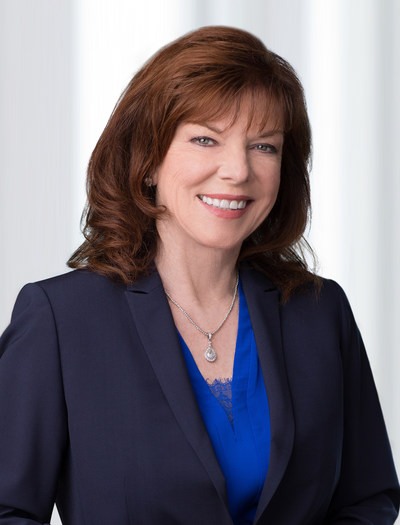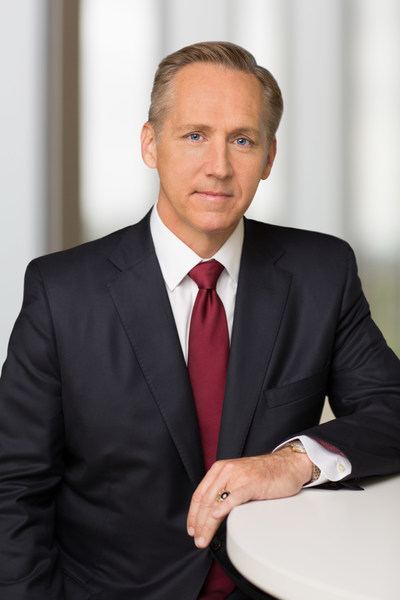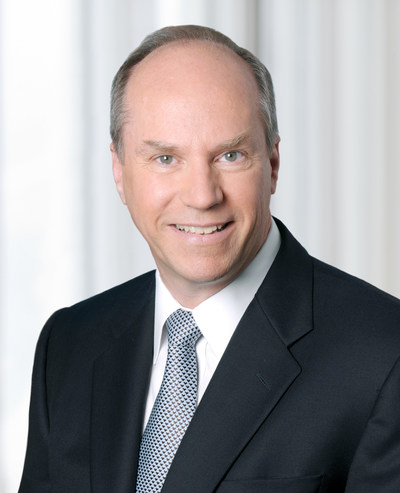SAN DIEGO, March 12, 2018 /PRNewswire/ -- After a 40-year career, Debra L. Reed, chairman, president and CEO of Sempra Energy (NYSE: SRE), has announced she plans to retire Dec. 1, 2018, and step down as CEO and president May 1. The company's board of directors has elected Jeffrey W. Martin, currently executive vice president and chief financial officer of Sempra Energy, to succeed Reed as CEO. Martin also has been appointed as a new member of Sempra Energy's board, effective May 1.
Joseph A. Householder, currently corporate group president of infrastructure businesses for Sempra Energy, has been elected to succeed Reed as the company's president.
From May until her retirement in December, Reed will continue to serve as Sempra Energy's executive chairman.
"Last month, I reached my 40th year in the Sempra Energy family of companies," said Reed. "We are close to concluding several of our major growth initiatives, such as expanding in Texas with our acquisition of a majority interest in Oncor and the anticipated launch of our liquefied natural gas (LNG) export business in Louisiana next year. We have established a strong growth engine in Mexico with our IEnova subsidiary. Our California and South America utilities continue to perform at a very high level, providing safe and reliable service to their millions of customers and innovating to adapt to future market needs.
"Over many years, our board of directors has led a robust leadership succession planning effort and today's announcement of new officer elections reflects the successful implementation of this planning. We have a talented and deep management team. Jeff Martin and Joe Householder are both tremendous leaders who will be excellent stewards of Sempra Energy's continued growth and success in the future. Both Jeff and Joe have broad career experience both inside and outside the energy industry and within our family of companies. They also both have demonstrated outstanding foresight and a keen ability to drive strong performance at every level of responsibility."
Martin, 56, has served as Sempra Energy's executive vice president and chief financial officer since January 2017. In his 13 years with the Sempra Energy family of companies, he has held a variety of increasingly responsible leadership positions. From 2014 through 2016, he was CEO (adding the titles of chairman and president in 2015) of San Diego Gas & Electric (SDG&E), one of Sempra Energy's regulated California utilities. From 2010 through 2013, Martin was president and CEO of Sempra U.S. Gas & Power and Sempra Generation, the predecessor companies of Sempra Energy's renewable energy and midstream businesses. Prior to that, he was vice president of investor relations for Sempra Energy. He first joined Sempra Energy in 2004 as a principal working in Sempra Energy's mergers and acquisitions group.
Before joining Sempra Energy, Martin was chief financial officer of NewEnergy, Inc. Also, he formerly served as corporate counsel at UniSource Energy and was an attorney at the law firm of Snell & Wilmer, focusing on corporate and commercial finance and real estate. Martin currently serves on the board of directors of the California Chamber of Commerce, where he is a member of its executive committee, and the board of trustees of the University of San Diego, where he is a member of the executive committee and chairs the athletics committee. He recently served on the boards of directors of the Edison Electric Institute, National Association of Manufacturers and San Diego Regional Chamber of Commerce.
Martin holds a bachelor's degree from the United States Military Academy at West Point, a master's degree in public administration from the University of Texas, El Paso, and a law degree from the University of Miami.
Householder, 62, has served as corporate group president of infrastructure businesses for Sempra Energy since January 2017, overseeing the company's operations in midstream, LNG, renewable energy and Mexico. Previously, from 2011 to 2016, Householder was Sempra Energy's executive vice president and chief financial officer. From 2007 to 2011, he served as senior vice president, controller and chief accounting officer for Sempra Energy. He joined Sempra Energy in 2001 as vice president of corporate tax and added the title of chief tax counsel in 2005, before being promoted to senior vice president and controller in 2006.
Before joining Sempra Energy, Householder was a partner at PricewaterhouseCoopers in the firm's national tax office. Previously, he was vice president of corporate development and assistant chief financial officer of Unocal, where he was responsible for worldwide tax planning, financial reporting and forecasting, and risk-management compliance. Earlier in his career, Householder served as an attorney and a certified public accountant at several firms in the Los Angeles area.
Householder serves on the board of Advanced Micro Devices and is a member of the Tax Executives Institute, the American Institute of Certified Public Accountants, the State Bar of California and the American Bar Association.
Householder holds a bachelor's degree in business administration from the University of Southern California and a law degree from Loyola Law School. Additionally, he has completed the executive program at the UCLA Anderson School of Management.
"A key priority in our decision was to ensure ample transition time for a smooth leadership succession," said William C. Rusnack, Sempra Energy's lead director. "In her seven years as CEO, Debbie Reed has sharpened Sempra Energy's strategic focus and led the company to new heights. Under her leadership, Sempra Energy's market value has more than doubled to nearly $29 billion. Debbie has built tremendous value for shareholders, taking our subsidiary, IEnova, public in Mexico, launching our LNG export business and, most recently, guiding the successful acquisition of a majority interest in Oncor, the largest utility in Texas."
Reed, 61, was named Sempra Energy's CEO in 2011 and assumed the additional role of chairman in 2012. Prior to her appointment as CEO, Reed was Sempra Energy's executive vice president. Previously, from 2006 to 2010, she served as president and CEO of SDG&E and Southern California Gas Co. (SoCalGas). She also was chief operating officer of the two utilities, after initially being appointed president of SDG&E in 2000. Reed first joined the company in 1978 as an energy systems engineer at SoCalGas. In 1988, she became the first female officer at SoCalGas and then served in a series of increasingly responsible leadership positions.
Currently, Reed is one of 27 female chief executive officers of Fortune 500 companies, and, from 2011 to 2017, she was recognized as one of Fortune magazine's "Most Powerful Women in Business." Reed also was recognized by Forbes magazine as one of the nation's most influential female CEOs.
Reed serves on the boards of directors of Halliburton Co. and Caterpillar Inc. She is a member of The Business Council and the Business Roundtable, where she serves on the Energy and Environment Committee and the Tax and Fiscal Policy Committee. She is a member of The Trusteeship, an affiliate of the International Women's Forum. Additionally, she serves on the Rady Children's Hospital and Health Center Board of Trustees and Rady Children's Hospital – San Diego Board of Directors, the board of councilors of the University of Southern California Viterbi School of Engineering and the Chairman's Competitiveness Council of the San Diego Regional Economic Development Corporation, where she formerly served as chair. Previously, she served on the boards of directors of Genentech and Avery Dennison Corp.
Reed graduated summa cum laude from the University of Southern California with a bachelor's degree in civil engineering.
Sempra Energy, based in San Diego, is a Fortune 500 energy services holding company with 2017 revenues of more than $11 billion. Including Oncor, the Sempra Energy companies' approximately 20,000 employees serve 43 million consumers worldwide.
This press release contains statements that are not historical fact and constitute forward-looking statements within the meaning of the Private Securities Litigation Reform Act of 1995. These statements can be identified by words such as "believes," "expects," "anticipates," "plans," "estimates," "projects," "forecasts," "contemplates," "assumes," "depends," "should," "could," "would," "will," "confident," "may," "can," "potential," "possible," "proposed," "target," "pursue," "outlook," "maintain," or similar expressions or discussions of guidance, strategies, plans, goals, opportunities, projections, initiatives, objectives or intentions. Forward-looking statements are not guarantees of performance. They involve risks, uncertainties and assumptions. Future results may differ materially from those expressed in the forward-looking statements.
Factors, among others, that could cause our actual results and future actions to differ materially from those described in any forward-looking statements include risks and uncertainties relating to: actions and the timing of actions, including decisions, new regulations, and issuances of permits and other authorizations by the California Public Utilities Commission (CPUC), U.S. Department of Energy, California Division of Oil, Gas, and Geothermal Resources, Federal Energy Regulatory Commission, U.S. Environmental Protection Agency, Pipeline and Hazardous Materials Safety Administration, Los Angeles County Department of Public Health, states, cities and counties, and other regulatory and governmental bodies in the United States and other countries in which we operate; the timing and success of business development efforts and construction projects, including risks in obtaining or maintaining permits and other authorizations on a timely basis, risks in completing construction projects on schedule and on budget, and risks in obtaining the consent and participation of partners; the resolution of civil and criminal litigation and regulatory investigations; deviations from regulatory precedent or practice that result in a reallocation of benefits or burdens among shareholders and ratepayers; approvals of proposed settlements or modifications of settlements; delays in, or disallowance or denial of, regulatory agency authorizations to recover costs in rates from customers (including with respect to amounts associated with the San Onofre Nuclear Generating Station facility and 2007 wildfires) or regulatory agency approval for projects required to enhance safety and reliability; the greater degree and prevalence of wildfires in California in recent years and risk that we may be found liable for damages regardless of fault, such as in cases where the doctrine of inverse condemnation applies, and risk that we may not be able to recover any such costs in rates from customers in California; the risk that rulings by the CPUC such as denying recovery for wildfire damages may raise our cost of capital and materially impair our ability to finance our operations; the availability of electric power, natural gas and liquefied natural gas, and natural gas pipeline and storage capacity, including disruptions caused by failures in the transmission grid, moratoriums or limitations on the withdrawal or injection of natural gas from or into storage facilities, and equipment failures; changes in energy markets; volatility in commodity prices; moves to reduce or eliminate reliance on natural gas; the impact on the value of our investments in natural gas storage and related assets from low natural gas prices, low volatility of natural gas prices and the inability to procure favorable long-term contracts for storage services; risks posed by actions of third parties who control the operations of our investments, and risks that our partners or counterparties will be unable or unwilling to fulfill their contractual commitments; weather conditions, natural disasters, accidents, equipment failures, computer system outages, explosions, terrorist attacks and other events that disrupt our operations, damage our facilities and systems, cause the release of greenhouse gases, radioactive materials and harmful emissions, cause wildfires and subject us to third-party liability for property damage or personal injuries, fines and penalties, some of which may not be covered by insurance (including costs in excess of applicable policy limits), may be disputed by insurers or may otherwise not be recoverable through regulatory mechanisms or may impact our ability to obtain satisfactory levels of insurance, to the extent that such insurance is available or not prohibitively expensive; cybersecurity threats to the energy grid, storage and pipeline infrastructure, the information and systems used to operate our businesses and the confidentiality of our proprietary information and the personal information of our customers and employees; capital markets and economic conditions, including the availability of credit and the liquidity of our investments; fluctuations in inflation, interest and currency exchange rates and our ability to effectively hedge the risk of such fluctuations; the impact of recent federal tax reform and uncertainty as to how it may be applied, and our ability to mitigate any adverse impacts; actions by credit rating agencies to downgrade our credit ratings or those of our subsidiaries or to place those ratings on negative outlook; changes in foreign and domestic trade policies and laws, including border tariffs, and revisions to international trade agreements, such as the North American Free Trade Agreement, that make us less competitive or impair our ability to resolve trade disputes; the ability to win competitively bid infrastructure projects against a number of strong and aggressive competitors; expropriation of assets by foreign governments and title and other property disputes; the impact on reliability of San Diego Gas & Electric Company's (SDG&E) electric transmission and distribution system due to increased amount and variability of power supply from renewable energy sources; the impact on competitive customer rates due to the growth in distributed and local power generation and the corresponding decrease in demand for power delivered through SDG&E's electric transmission and distribution system and from possible departing retail load resulting from customers transferring to Direct Access and Community Choice Aggregation or other forms of distributed and local power generation, and the potential risk of nonrecovery for stranded assets and contractual obligations; risks associated with the acquisition of our interest in Oncor Electric Delivery Company LLC (Oncor), including, but not limited to, any adverse impact of the acquisition on the credit ratings of Sempra Energy or Oncor, plans regarding future capital investments by Sempra Energy or Oncor, future return on equity or capital structure of Sempra Energy or Oncor, the risk that the anticipated benefits from the acquisition may not be fully realized or may take longer to realize than expected, the risk that we may be unable to obtain additional permanent equity financing for the acquisition on favorable terms, the risk that indebtedness Sempra Energy has incurred in connection with the acquisition may make it more difficult for Sempra Energy to repay or refinance our debt or take other actions that may decrease business flexibility and increase borrowing costs, and the risk that Oncor will eliminate or reduce its quarterly dividends due to its requirement to meet and maintain its regulatory capital structure, or because any of the three major credit rating agencies rates Oncor's senior secured debt securities below BBB (or the equivalent) or Oncor's independent directors or a minority member director determine it is in the best interest of Oncor to retain such amounts to meet future capital expenditures; and other uncertainties, some of which may be difficult to predict and are beyond our control.
These risks and uncertainties are further discussed in the reports that Sempra Energy has filed with the U.S. Securities and Exchange Commission (SEC). These reports are available through the EDGAR system free-of-charge on the SEC's website, www.sec.gov. Investors should not rely unduly on any forward-looking statements. These forward-looking statements speak only as of the date hereof, and the company undertakes no obligation to update or revise these forecasts or projections or other forward-looking statements, whether as a result of new information, future events or otherwise.
Sempra South American Utilities, Sempra Infrastructure, Sempra LNG & Midstream, Sempra Renewables, Sempra Mexico and Infraestructura Energética Nova, S.A.B. de C.V. (IEnova) are not the same as the California Utilities, San Diego Gas & Electric Company (SDG&E) or Southern California Gas Company (SoCalGas), and are not regulated by the California Public Utilities Commission.
SOURCE Sempra Energy
Related Links
WANT YOUR COMPANY'S NEWS FEATURED ON PRNEWSWIRE.COM?
Newsrooms &
Influencers
Digital Media
Outlets
Journalists
Opted In



Share this article